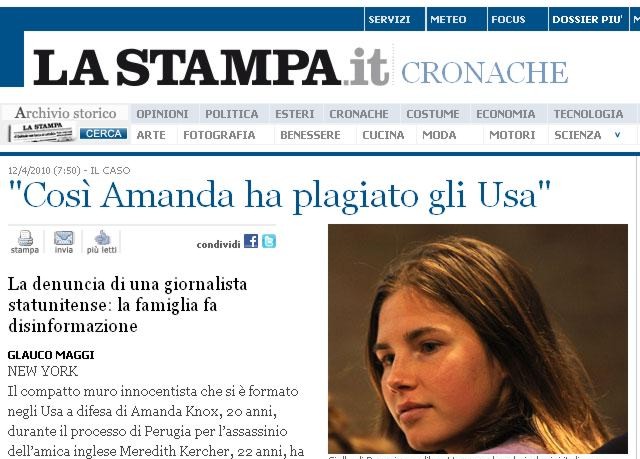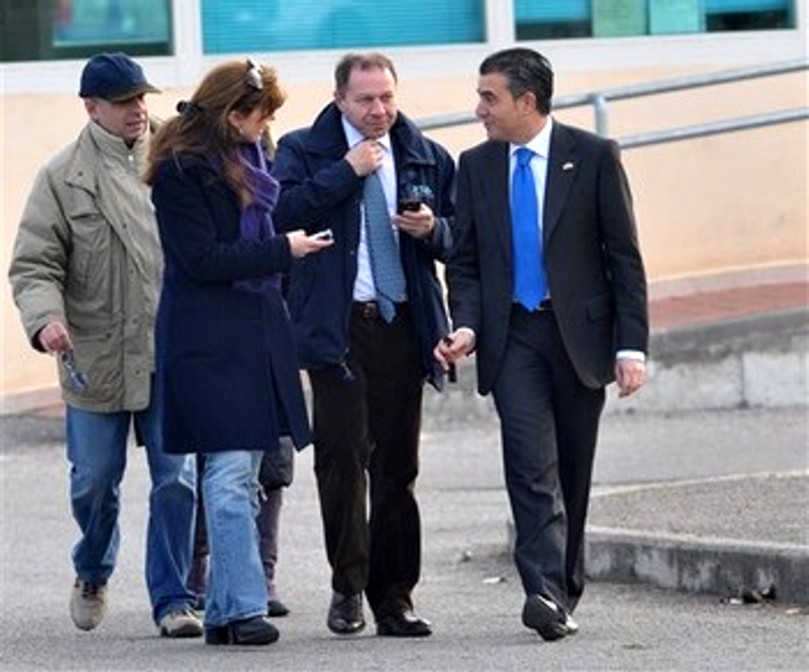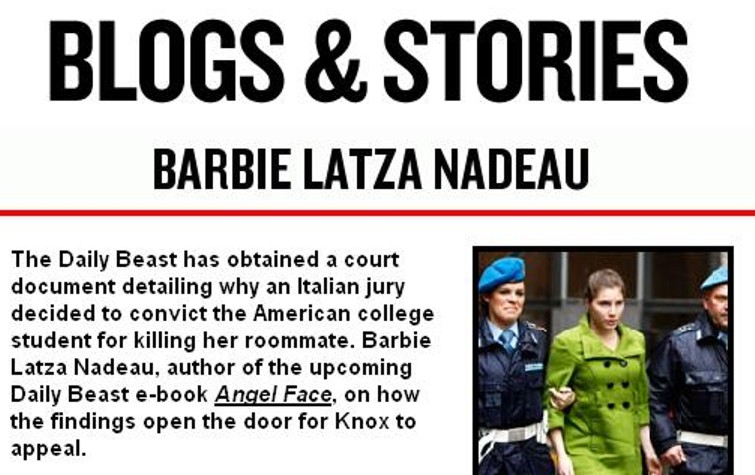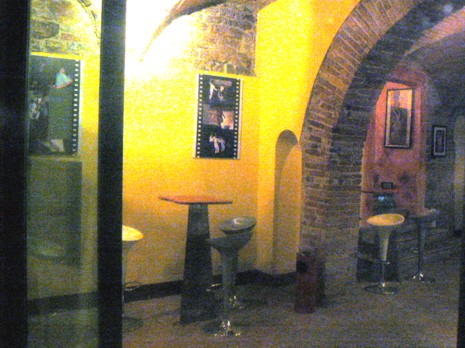
Category: Hoaxes Knox & team
Tuesday, June 01, 2010
Knox Hearing On Calunnia Charges Technicality, Then Trial Set To Be Under Way June 16
Posted by Peter Quennell
Nick Squires in Rome for the Daily Telegraph has the report which includes this.
Knox’s lawyer, Luciano Ghirga, argued that it was inappropriate for the slander charge to be heard by judge Claudia Matteini, because she had been involved in one of the preliminary hearings into the Kercher murder.
The case on Tuesday was adjourned until June 17, when another judge is likely to be assigned to the case. The trial is likely to start on October 1. Her appeal is also expected to start in the autumn, meaning that the two cases could run concurrently.
If Knox is found guilty of slander, she could face another six years in jail, on top of the 26 years she is currently serving.
And Knox could face MORE time than 26 plus six years if the prosecution wins it on appeal. Possibly a total of forty.
So much for the PR campaign and the ongoing misinterpretation of the evidence and sliming of the prosecution by the “pro-Knox” websites. Guede of course ran no campaign, his lawyers and friends were always respectful, he took the short-form trial (an admission of some kind of guilt), and he tried some sort of apology to Meredith’s family.
And after his first appeal he emerged with only 16 years.
Sunday, May 30, 2010
Questions For Knox And Sollecito: Ten From Daily Beast As Knox Calunnia #2 Trial Starts
Posted by Peter Quennell

This Daily Beast report indicates that the cancelled jailhouse TV interview with Amanda Knox was a lot more firmed-up than Knox’s stepfather, Chris Mellas, seems to have claimed.
And it outlines the first phase of Knox’s Calunnia #2 trial which is based on charges brought by the interrogating police, all of whom testified at her trial that she was treated well during her interrogations as a witness and suspect. .
Click the image or link above above for the fine reporter Barbie Nadeau’s full article on some issues Knox has never been able to account for, including Knox’s callous skipping of Meredith’s memorial service.
The ten questions are all very tough, and each would also have been asked by the jury. Here they are:
.:
It’s back to court for Amanda Knox, the 22-year-old Seattle native currently serving 26 years in prison in Italy for sexually assaulting and murdering her British roommate, Meredith Kercher.
This week, Knox is expected to attend a preliminary hearing on slander charges lodged against her for accusing Perugia police of abuse. During her testimony at her murder trial last June, she accused the cops of slapping her on the back of the head during an interrogation just days after Kercher’s body was discovered in November 2007.
The police deny hitting her, and Knox’s own lawyers have never filed charges for the alleged abuse. If she is convicted of slander, a judge could add six years to her sentence….
Knox’s resurgence in the headlines was to coincide with a joint jailhouse interview she had granted to ABC News and the Italian broadcaster Mediaset’s Matrix program. But the bureau of prisons denied the interview in the final hour, effectively silencing Knox indefinitely.
A high-profile jailhouse interview with Knox is considered the Holy Grail by journalists covering the case, and the American and Italian networks have been vying for a chance to ask Knox a few questions on camera. Now it is unlikely anyone will get an interview before Knox’s appeal hearings this fall.
But if we did, there are a few questions we’d want her to put to rest.
1. Why did you and Raffaele Sollecito turn off your cell phones at the same time the night of November 1, 2007 and on again at the same time the next morning? You told the police that you and Raffaele slept late the morning of November 2, 2007, but phone records show that you both turned your phones back on very early that morning. How could that be?
2. Why were you bleeding? Your lawyers agree with the prosecution’s findings that at least one of the spots of Meredith’s blood found in the house where she was killed had your blood mixed with it. Your mother told me that you had your period. Your stepfather told others that your ear piercings were infected. Which was it?
3. Once you realized your mistake in blaming Patrick Lumumba for Meredith’s murder, why didn’t you tell the authorities? You told your mother that you felt bad about it, so why didn’t you alert an official so Patrick could be set free?
4. Why did you go with Raffaele to the police station on November 5? You were not called in for questioning. Did you realize at that time that you were both under suspicion?
5. Why weren’t your and Raffaele’s fingerprints found in your house after the murder if the two of you had spent time there that morning and the day before? Only one half-print on a glass in the kitchen has been attributed to you, yet you have claimed that you took a shower there that morning. How did you spend so much time there and leave virtually no trace?
6. Why did you take the mop and bucket from your house over to Raffaele’s house? You told the prosecutor during your testimony in June 2009 that you took the mop and bucket to his house to clean up a leak under his kitchen sink. But by your own testimony, the leak was miniscule and could have been easily cleaned up without it. What were you really doing with the mop?
7. What would you do differently if you had a chance to rewind the clock back to November 3, 2007? Would you go to the memorial service for Meredith? Would you still have gone to the police station with Raffaele? Would you have left for Germany when your aunt asked you to?
8. What do you think happened the night Meredith was killed? You have professed your innocence. Who do you think killed her and under what circumstances?
9. What do you really think of the Italian justice system? You told an Italian parliamentarian that you got a fair trial, and you even thanked the prosecutors for trying to solve the mystery of Meredith’s death, but your supporters at home in Seattle maintain that the Italian system is corrupt and unfair. What is your real view?
10. Is there anything you wish you would have said in court during your trial? You talked about your vibrator and about how you did not want an assassin’s mask forced on you. But in your final appeal after the closing arguments on December 4, 2010, why didn’t you say the words, “I did not kill Meredith Kercher?” Raffaele did when it was his turn to speak. Why didn’t you?
Our posting soon of the judges’ sentencing report will open up dozens of new questions for Knox. Such as: “How did you track Meredith’s blood into your own room and leave three traces revealed by luminol?”
Wednesday, April 14, 2010
La Stampa Headline Reads: “This Is The Way That Amanda Subjugated America”
Posted by Tiziano
There’s an excellent review in Italian of “Baby Face” by Glauco Maggi in Italay’s most influential paper, La Stampa. This is the translation.
The Accusation of an American Journalist: the Family Is Spreading Misinformation.
The dense wall of the believers in her innocence, which sprung up in the USA in defence of Amanda Knox, 20 years old, during the trial in Perugia for the murder of her English friend, Meredith Kercher, 22 years old, has been subjected to the first blow from the American side.
In the book Angel Face (Angel Face, the true story of the student killer Amanda Knox), the journalist from Newsweek, Barbie Latza Nadeau, accuses the family of the girl, condemned to 26 years for the voluntary murder, of having created “an innocentista media machine” which has tried to cancel out the heavy body of clues which built up during the trial.
“They have simply chosen to ignore the facts which were coming to light in Italy”, writes Nadeau, who has been the Rome correspondent for Newsweek and other American newspapers since 1996, from the site of the Daily Beast to major television networks (CBS, NBC, Fox and CNN).
The accusations of the journalist are based on her direct experience as a witness, in Italy, of the conduct of the American media. According to Nadeau, access to sources close to Amanda depended on the feelings expressed by the correspondents: the family, essentially, cooperated only with the believers in Amanda’s innocence, to the extent of the payment of travel expenses in exchange for exclusive interviews.
An example of the climate created by the Knox family is the affair of lawyer Joe Tacopina. Having arrived in Perugia as a “legal expert” for the ABC TV channel, at first he played the role of an unofficial of the defender of the interests of the Knoxes. However, when he confided to Nadeau that he could not declare himself to be 100% sure of Amanda’s innocence, having studied the trial documentation, he was excluded from the family circle, which from that moment curled up like a porcupine and actively operated so that their own version would be the only one to reach the USA.
From the moment of the arrest, Nadeau writes, “Amanda and Raffaele were a pushover for the sales of Italian newspapers and of the English tabloids. The local press reported the gossip of the lawyers and the magistrates to liven up the crime story and very soon labelled Amanda as Angel Face, encouraging a morbid fascination.
The British newspapers, ardent in the defence of the English victim’s honour, dug into the details which Amanda had inadvertently put on the Internet, starting from her name on MySpace, Foxy Knoxy. Phone calls to teachers and friends in Seattle provided the description of a studious, intelligent and athletic young girl. But the social networking sites told another story.”
Nadeau unveils the video on YouTube of Amanda drunk at a party, but she strikes the most serious blow to “good girl” when she adds: “Other appearances suggest a more enigmatic and a darker personality. Baby Brother, a film which Amanda had put
on MySpace, is not totally disturbing but contains a rather irresponsible reference to rape.”The investigators took the stories which emerged about her past “as proof that she had at least daydreamed about it, that this was in her mind. Add drugs and alcohol, was their reasoning, and not much was needed for these hidden thoughts would lead to action. The picture was being formed of a shrew who was in thrall of dark impulses and the family struggled to control the storm.” For those who did not accept the reconstructions of the Knoxes as pure gold there was ostracism:
“The TV crews learnt to be careful in letting themselves be seen with people like me, the family would have cut them out of the circle.”
Wednesday, April 07, 2010
The Transcript Of Today’s Online Chat Session With Barbie Nadeau Of The Daily Beast
Posted by Peter Quennell
Lucas Wittmann:
Hi, I’m the Books Editor at The Daily Beast and I’m delighted to welcome Barbie Latza Nadeau and our readers to discuss her new book, Angel Face…
BARBIE LATZA NADEAU:
I’m Barbie Latza Nadeau. Welcome.
[Comment From kcolorado: ]
how was your sense of who she is affected by seeing her in court everyday? Have you spoken with her directly?
BARBIE LATZA NADEAU:
Seeing Amanda Knox walk into the courtroom every day was very important in understanding how she interacted with her lawyers and her family, and in understanding how the jury perceived her. Amanda has not yet given any one-on-one interviews so no, I have not spoken to her directly.
Lucas Wittmann:
Just so you know we see your comments and will publish them live as Barbie is ready so please keep them coming…
[Comment From Kevad: ]
You have also stated in tv coverage that “we still do not really know what happened in that room”, is that how you still feel?
[Comment From stint: ]
Great job with book, Barbie. I really enjoyed it.
BARBIE LATZA NADEAU:
Yes, after over two years following this case, none of us know exactly what happened in Meredith’s bedroom that fateful night. No one has confessed to the crime, so until someone does, we will not have a clear understanding of the exact dynamic of the murder.
[Comment From Guest: ]
How do you think your journalism during the trial affected its outcome?
BARBIE LATZA NADEAU:
Thank you. I’m glad you liked the book. My hope is that it provides perspective of this complex case.
BARBIE LATZA NADEAU:
I don’t think that any of us who covered this trial as journalists had a direct impact on the jury’s decision. We were not in the deliberation room.
[Comment From Wade: ]
Why in your opinion did the seattle media frame the events as they did
BARBIE LATZA NADEAU:
I think that many of my colleagues in the Seattle market did the best job they could with the information they had. Their primary source was the Knox family, so their coverage was affected by that. When members of the Seattle press came to Perugia, they did not speak Italian and had a difficult time following the court sessions because there was no translator. Those of us who live and work here in Italy often helped the American press as best we could.
[Comment From stint: ]
Regarding earlier comment. Since Knox Family PR firm *very* closely controls any and all media contact with themselves, and they have reportedly blackballed any reporters even seen *near* you, do you really think you might interview Amanda in the future
BARBIE LATZA NADEAU:
I have hope that Amanda might want someone objective who understands Italian to conduct an interview with her at some point down the road. But because I have been skeptical, I am fairly sure I am not high on the list of interview candidates.
[Comment From mnh12121887:
But why did the American media take the Knox family version so much on face value without even trying to look deeper?
BARBIE LATZA NADEAU:
I think that the economic crisis has played a role. Many bureaus have been closed across Europe and it would have been a major expense to send a correspondent to Italy for such a long trial. I think that had there been a larger Italian based press corp it would have made a difference in coverage.
Lucas Wittmann:
Let’s explore now the facts of the case.
[Comment From Guest: ]
Do you believe Knox’s assertion that she was abused during her final interrogation?
BARBIE LATZA NADEAU:
I think it depends how you define “abused.” If you mean to ask if she was flicked on the back of the head (which is a cultural norm here in schools and in criminal investigations), then yes, that very likely happened. If you mean to ask if she was abused in the way the American police have been caught on CCTV abusing detainees, then no, I do not think she was abused.
[Comment From Guest: ]
You seem to have made some strange claims in your book - about AK and RS actually NOT remembering what happened. How on earth did you reach that conclusion?
BARBIE LATZA NADEAU:
I gave my hypothesis about the crime based on sitting through 11 months of a trial. I believe that if Amanda and Raf would have remembered exactly what happened, whether they were involved or not, their explanation of the evening of November 1 would have been more clear. A lie is often very black and white. Their confused responses seemed to me to be more consistent with a hazy memory or no memory at all.
[Comment From hattie: ]
I still believe that Amanda Knox is innocent, and I read your book to get another point of book. Thank you for that. My concern is that there is so much more DNA evidence against Rudy. How was Amanda able to clean up and not leave more DNA evidence in Meredith’s room?
Lucas Wittmann:
Don’t have Angel Face yet? Order it now as an e-book or paperback: http://bit.ly/chDjIX
BARBIE LATZA NADEAU:
I think it is important to remember that the same scientific police and laboratories tested the DNA for all three suspects. That is to say, if the DNA matches Rudy and is accepted, then the DNA that matches the other two should also be accepted. How she may have left so little DNA if she was actually in the room is very hard to square. Whether some of the 14 unidentified fingerprints belong to her is a big question in this case. There were very few fingerprints on any flat surfaces belonging to Rudy either. Is it possible to pick and choose how to clean up DNA? Maybe not, but it is possible to wipe up fingerprints and footprints that you know are your own.
[Comment From Guest: ]
If they didn’t remember then why did they do the clean up? They clearly knew they had ‘something’ to hide!
BARBIE LATZA NADEAU:
That is a very good question. Perhaps waking up in a house with a dead body makes one act irrationally. Perhaps because they might not have remembered what they did the night before, they panicked. We do not know, but that is one question I will ask Amanda if I ever get a chance.
[Comment From Guest: ]
After 11 months viewing the trial, do you believe that Amanda joined in any sort of sex game with Meredith? It seems that Amanda did, bt then went to her room BEFORE and DURING the murder.
BARBIE LATZA NADEAU:
There is no forensic evidence that Amanda had sexual relations with Meredith. I have a hard time accepting that it started as a sex game. I believe that if they were involved it was because they could not stop themselves from an aggravated escalation of violence. In essence, they could not tell agony from ecstasy and did not realize that Meredith needed their help. Instead, they may have helped Rudy and that is when things got out of control.
[Comment From Lisa: ]
I see that some folks her responded to the question “Who Killed Meredith Kercher” with “Amanda and Raffaele” only. No Rudy. How could that be? Do you think journalism had anything to do with that?
Lucas Wittmann:
We’re going to wrap this up in 10 minutes so please contribute any final questions now.
BARBIE LATZA NADEAU:
I think that the fact that Rudy’s trial was sewn up before Amanda and Raffaele’s began is the reason many people separate them in this crime. But Rudy was convicted for his role in the murder, not as a lone assailant. His judge’s reasoning clearly states that he felt Rudy acted in tandem with Amanda and Raffaele.
[Comment From mhm12121887: ]
What is happening now—in Italy?
[Comment From Noel: ]
How do you see the appeal going?
BARBIE LATZA NADEAU:
Right now lawyers for both Amanda and Raf are preparing their appeal briefs. Those will be filed within a few weeks and then the date will be set for the appeal hearing, likely in the fall.
[Comment From Kermit: ]
Hi Barbie. Your journalism has opened up transparency and debate from an Iron-Curtain situation of control in the American press. Where do you see each of the three convicted (pending appeal) murderers 10 and 20 years from now?
[Comment From stint: ]
Thanks so much for this opportunity, and again thanks for all your objective coverage in “Angel Face”.... great read.
BARBIE LATZA NADEAU:
I think that the appeal will result in a few years taken from the sentences of both Amanda and Raffaele.
[Comment From Guest: ]
hasn’t her real beauty complicated this hugely from day one?
[Comment From hattie: ]
Thank for an excellent book. I read it in one day, and it gave me a different side of the story. I hope that both pro- and anti-Amanda sides will take an opportunity to read this book.
BARBIE LATZA NADEAU:
I think that it is very likely that all three of the convicted murderers of Meredith Kercher will return home one day.
Lucas Wittmann:
Here is the link if you’d like to order the Angel Face e-book and paperback: http://bit.ly/chDjIX
[Comment From mhm12121887: ]
Thanks also for the book and for the “on the spot” reporting and objectivity
BARBIE LATZA NADEAU:
I think that Amanda’s beauty has increased the interest in this case, but I do not think that it dictated the outcome.
[Comment From Patty: ]
Thanks for answering questions Barbie.
Lucas Wittmann:
Down to our final question…
[Comment From somealibi: ]
(For the end) Compliments on the presentation and technology with the poll-type questions
[Comment From Patty: ]
Do you think any of them will ever confess?
[Comment From Guest: ]
You’ve been a real heroine in this case Barbie. Well done for your objective reporting.
Lucas Wittmann:
Thanks for answering the polls!
BARBIE LATZA NADEAU:
I think that one day we will have a confession, yes. But not while they are in prison.
Lucas Wittmann:
Wait…one more!
[Comment From Guest: ]
Can you give your reactions to the 2 op-ed pieces in the NYTimes (Seattle writere)?
[Comment From Guest Guest: ]
Can we have another session please????
Lucas Wittmann:
Re: another session. So many great comments and questions, we’ll keep it in mind.
BARBIE LATZA NADEAU:
I was in Perugia when those op-ed pieces came out and they were not helpful to Amanda. The prosecutor was angry, the jury members were insulted and Amanda’s own lawyers were not happy. Op-ed pieces are by nature controversial, but they should be weighed to see whether they will impact the topic. That sort of journalism likely had more impact on this case than what anyone wrote with a Perugia dateline.
Lucas Wittmann:
Thanks everyone for participating!
And thanks Barbie for answering all these great questions.
[Comment From ricardoricardo: ]
which ‘op-ed’ pieces > do you have a link ?
Lucas Wittmann:
Here is the link: http://opinionator.blogs.nytimes.com/2009/06/10/an-innocent-abroad/
[Comment From Guest: ]
Cheers Barbie! Will raise a glass to you tonight…
BARBIE LATZA NADEAU:
Thank you. I want to also thank Andrea Vogt, of the Seattle P-I who was a voice of reason in Seattle during the trial based in Italy. The op-ed pieces are by Timothy Egan.
[Comment From Guest:]
Thank you. This is nice technology and nice pace. Could have been twice as long 😊
[Comment From somealibi: ]
Keep it going Barbie - thanks - we value an objective take
Lucas Wittmann:
Thanks again to everyone and we’ll definitely keep this in mind the next time.
[Comment From ricardo: ]
many thanks…
[Comment From Patty: ]
Thank you, and Andrea, for your coverage of the trial. Invaluable.
BARBIE LATZA NADEAU:
Thanks to everyone who sent question.
[Comment From Clander: ]
Ciao from Roma !! You ROCK Barbie !
Friday, March 19, 2010
Rome Panel On Meredith’s Case: Seems To Have Been Shallow, But Of No Comfort To Knox Apologists
Posted by Cesare Beccaria
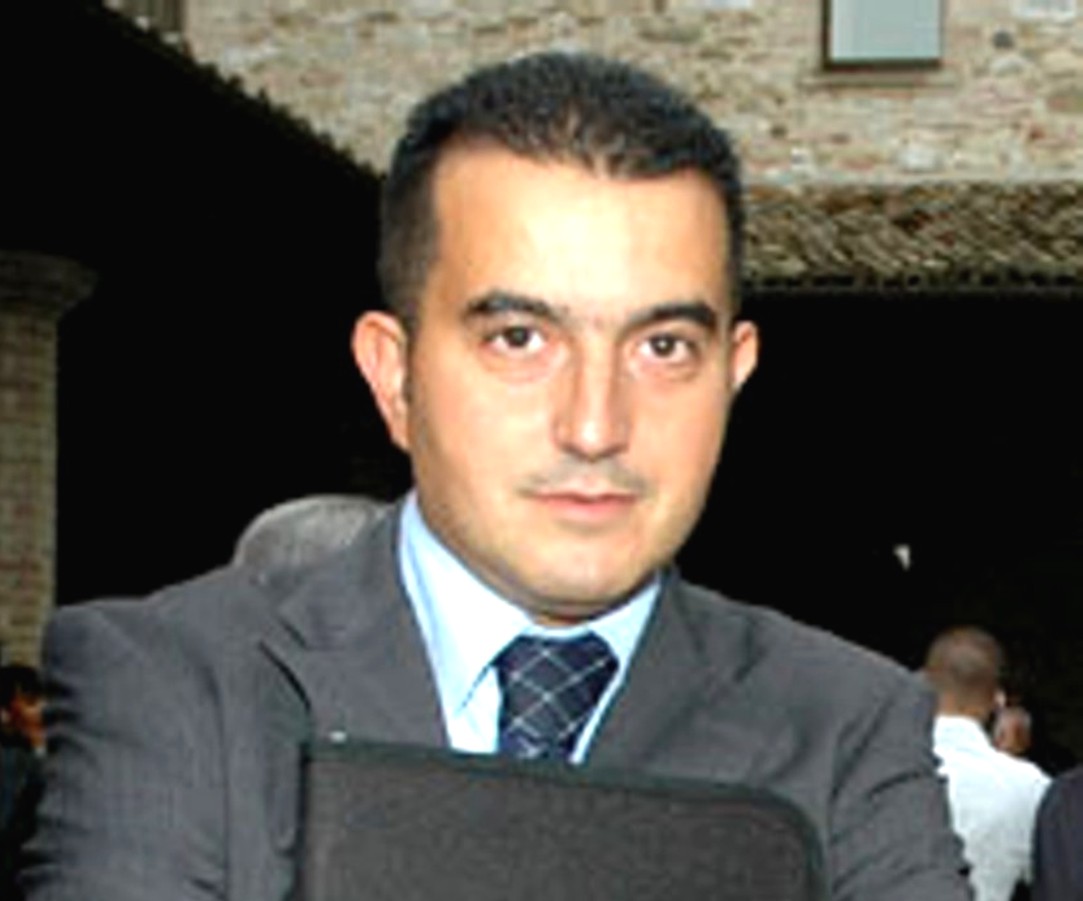
[Above: IAF president Rocco Girlanda - a wannabe Italian David Marriott?]
The outrage that directly led to the creation of TJMK late in 2008 was the deliberate attempt to disappear Meredith and to replace her as the “real victim”.
Reversing that horrible trend and ensuring Meredith is revered, and at the end of the day granted her true justice, has always been our main mission. We have also worked to reverse the horrible sliming of Italy (a country Meredith loved and so looked forward to) and the officials and the trial process.
As far as we can see no English-language media have better explained the impressive Micheli Report and the impressive Italian system and the powerful evidence of guilt. Or for that matter lately shown Italy in such a positive light.
Ideally, if it had wanted to spread actual understanding, the Italian American Foundation Rome panel yesterday should have covered much of that same ground.
As far was we can see, it didn’t. And there seems to have been little mention of Meredith.
But at least the panelists seem to have come up with no new criticisms. Today Italy looks no worse, and Knox’s position looks no better. And the panel was inconclusive on what might have happened differently in the United States. (We reckon the outcome would have been identical but the sentences would have been Life.)
Andrea Vogt reports for the Seattle P-I on yesterday’s doings. Key excerpts below.
1) On the Italian American Foundation panel
The gathering was not so much an exercise in legal theorizing as one to smooth the hard feelings between Italy and the United States over the trial of one American college student. It’s a case that has spawned books, Websites and congressional involvement.
In fact, experts decided they couldn’t say what would have happened in an American trial.
“The only answer is, it is impossible to answer this question,” lawyer Anthony Sistilli told the audience, according to ANSA Italian wire services that covered the forum. “We do not want to retry the case. We want to help bridge the gap of understanding, which is our mission for this meeting.”...
“Trial outcomes are unpredictable. You really can’t guess what the outcome would be,” Arcabascio, who is co-director of the Florida Innocence Project, told the crowd. “But reasonable doubt is a standard of proof we use in both countries.”
Arcabascio also noted that sequestered juries are still used in the United States, but less and less common due to the high cost….
“No-one had any intention of bringing up criticisms,” said Rocco Girlanda, president of the U.S.-Italy Foundation told seattlepi.com. “Our scope was simply to compare the judicial systems and trial processes of Italy and the U.S.”
2) On Amanda Knox in prison
Girlanda ended the evening on a light note, saying that perhaps after the case’s expected appeal, the association would even have the chance to have a “special honored guest,” meaning Knox.
He also mentioned that the association is continuing to meet regularly with Knox in prison. Italy-USA Association officials said that prison authorities have called Knox’s behavior in Capanne “exemplary.”
Though she had requested work in the prison laundry, she has been given a less menial task with the prison commissary. Her job, according to foundation officials who meet with her, is to take orders from the various cellmates about what they want from the prison store. Inmates are able to buy items such as candy, cheese, soda or other small shopping items.
There are also some must-read paragraphs by Andrea Vogt on the very fishy commercial aspects of IAF president Rocco Girlanda’s role in the case. Is he seeking a PR contract?
Rocco Girlanda, who is also a parliamentarian and PR consultant, has been criticized before for raising false hopes for Knox apologists, and yesterday he did it again.
Andrea Vogt also reports on the state of Seattle-Perugia relations (with links to some Facebook pages), on the new books on the case, and on a new pro-Sollecito website, apparently created by a certain Chris Mellas.
What a surprise.
Low-traffic low-traction and generally highly inaccurate apologist websites, all with a nasty sneering tone, seem to be springing up like wildflowers these days.
************
Below: IAF president Rocco Girlanda at right with fellow parliamentarians outside Capanne Prison, after visiting Amanda Knox.
Thursday, March 04, 2010
Sentencing Report: Barbie Nadeau Quotes The Motive, Physical Evidence, And Alibis
Posted by Peter Quennell
Please click above for Barbie Nadeau’s full report on the Daily Beast website. Key excerpts.
1) The motive
“One can hypothesize that the bad decision came after the consumption of stupefying substances.”
But they disagreed on the motive. The prosecution lawyers began their case in January, 2009 by arguing that Kercher was killed during a sex game gone awry. By closing arguments, they had changed the theory slightly, trying to make the case that Knox resented her prissy British roommate and killed her in hatred. The jury rejected both theories, and the reasoning document declares that “the killing was carried out with no planning, no animosity and no revenge against the victim.
“The two young lovers, interested in each other and in the intellectual and cultural world around them, would not have made a conscious decision to kill Kercher. Instead, the judge wrote, they killed spontaneously under the influence of drugs. “One can hypothesize that the bad decision came after the consumption of stupefacente””stupefying substances””that Amanda verified in her testimony.”
As the jury saw it, Knox, Sollecito and Rudy Guede, the Ivory Coast native who was convicted for his role in Kercher’s murder after a fast-track trial in 2008, came to the house the two girls shared in order to get high. Guede used the toilet, then became aroused when he saw Knox and Sollecito making out. He went to Kercher’s room and made sexual advances toward her. The reasoning refers to evidence presented at Knox’s trial that Guede was the type of guy that “bothered women” when he was under the influence.
Then, according to the reasoning, Kercher cried out for help, but instead of helping her, Knox and Sollecito, their judgment impaired, decided instead to help Guede. The killing was based on “sexual-erotic violence” but not with Knox as the mastermind. The jury felt that it was Guede who led that attack, and the other two, too high to know better, joined in.
2) The physical and forensic evidence
The judge’s reasoning also underscores what the jury believed to be the most important elements of the prosecution’s forensic case. They believed that a kitchen knife with Knox’s DNA on the handle and a trace of Kercher’s on the blade was the weapon that made the large fatal wound in Kercher’s neck. They also referred to Sollecito’s “knife habits,” surmising that, as an admitted collector of blades, he likely used his own knife to make the second wound. The jury agreed that Sollecito and Knox conspired to stage a break-in in another bedroom to cover their tracks.
And they attributed an unidentifiable bloody shoeprint found on the pillow under Kercher’s body to Knox, even though the prosecution only implied that it was compatible with a woman’s shoe size. A spot of Knox and Kercher’s mixed blood in one of the bedrooms, found using Luminol, and four additional spots in the small bathroom the girls shared also swayed the jurors.
“These were left when Amanda was cleaning her hands and feet of Kercher’s blood,” the judge wrote.
3) The Knox and Sollecito alibis
The judge also wrote emphatically about the lack of credible alibi. Although Knox and Sollecito claimed to be at his apartment all night, “Not one phone call, not one meeting, no computer activity or any other element proved that they stayed at that apartment.” And the judge was particularly hard on Knox for accusing Patrick Lumumba, an innocent man, of the murder “knowingly and deceivingly.”
Overall, however, it appears that the jury was sympathetic to the two suspects, but ultimately felt that they committed a crime for which they must pay a hefty price.
Friday, February 05, 2010
True Justice Is Rendered For Patrick Lumumba (Sort Of)
Posted by Tiziano
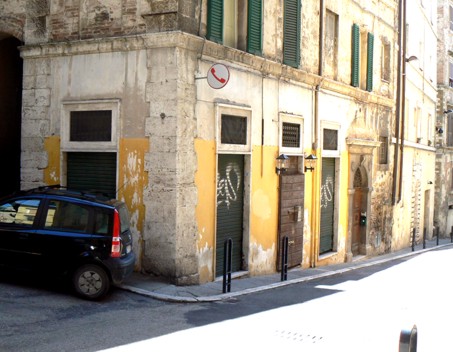
Above & below: Patrick’s bar which Knox managed to drive out of business.
1. Explanation of calunnia
Knox was prosecuted by the Republic of Italy, not by Lumumba, on a calunnia charge and her prison sentence was extended when she was found guilty of that.
The charge of calunnia (art. 368) has been commonly translated as “slander” in the English/US media. This translation is incorrect, however, as calunnia is a crime with no direct equivalent in the respective legal systems.
The equivalent of “criminal slander” is diffamazione, which is an attack on someone”Ÿs reputation. Calunnia is the crime of making false criminal accusations against someone whom the accuser knows to be innocent, or to simulate/fabricate false evidence, independently of the credibility/admissibility of the accusation or evidence.
The charges of calunnia and diffamazione are subject to very different jurisprudence. Diffamazione is public and explicit, and is a more minor offence, usually resulting in a fine and only prosecuted if the victim files a complaint, while calunnia can be secret or known only to the authorities. It may consist only of the simulation of clues, and is automatically prosecuted by the judiciary.
The crimes of calunnia and diffamazione are located in different sections of the criminal code: while diffamazione is in the chapter entitled “crimes against honour” in the section of the Code protecting personal liberties, calunnia is discussed in the chapter entitled “crimes against the administration of justice”, in a section that protects public powers.
2. Knox Defense
Knox took the stand for two days during her trial, of course, trying to explain why she did what she did to her kindly former employer.
She only seemed to dig herself in deeper.
3. Patrick’s Win
Now Terni In Rete confirms his government compensation for his several weeks in Capanne and some damaging badmouthing.
CASSATION: EIGHT THOUSAND EUROS FAIR COMPENSATION FOR PATRICK LUMUMBA
February 4th, 2010
By Adriano Lorenzoni
The fourth criminal session of the Court of Cassation has established that the sum of eight thousand Euros is fair compensation for Patrick Lumumba, the Congolese involved in spite of himself in the murder of the English student, Meredith Kercher.
Lumumba was dragged into involvement by Amanda Knox, and precisely because of her statements spent 14 days in prison. Then the elements gathered by the investigators completely exonerated him. For that unjust imprisonment Lumumba had requested damages of 516 thousand Euros.
In the trial for the murder of Meredith Kercher, Amanda Knox was condemned to 26 years imprisonment, her ex-fiancé, Raffaele Sollecito to 25.Knox, precisely for her false accusations against Lumumba, was condemned to the payment of damages of the sum of 50 thousand Euros with an interim award, immediately applicable, of ten thousand Euros. Neither Lumumba nor his lawyer wished to comment on the decision of the Court of Cassation.
Thursday, January 07, 2010
The False Accusation By Amanda Knox Against Patrick Lumumba
Posted by The Machine
This incisive video by our main poster ViaDellaPergola explores Amanda Knox’s accusations against Patrick Lumumba - made even though she knew very well he had then been at his bar.
These accusations resulted in Patrick’s arrest and imprisonment on the morning after the night that she first voiced them. Knox first made the claims as a WITNESS and so no lawyer was present, and so the statement was not entered into evidence.
But later on 6 November 2007 when she was in her prison cell as a SUSPECT she wrote her claims all out again. This purely voluntary written statement (alibi version 4) by definition puts her at the scene of the crime.
This written statement WAS entered into evidence - and not retracted or modified in any way until all believability had flown, and Patrick was already back home with his family.
In fact, it was not until she was on the stand on June 12 and 13 2009 that Amanda Knox came up with Alibi Version 5. This is the one never supported by Sollecito - where she claimed she was at his place all night. Amanda Knox STILL has no alibi that stands firm.
Knox is being prosecuted by the Republic of Italy, not by Lumumba, on a calunnia charge.
Explanation of
calunnia
The charge of calunnia (art. 368) has been commonly translated as “slander” in the English/US media. This translation is incorrect, however, as calunnia is a crime with no direct equivalent in the respective legal systems.
The equivalent of “criminal slander” is diffamazione, which is an attack on someone”Ÿs reputation. Calunnia is the crime of making false criminal accusations against someone whom the accuser knows to be innocent, or to simulate/fabricate false evidence, independently of the credibility/admissibility of the accusation or evidence.
The charges of calunnia and diffamazione are subject to very different jurisprudence. Diffamazione is public and explicit, and is a more minor offence, usually resulting in a fine and only prosecuted if the victim files a complaint, while calunnia can be secret or known only to the authorities. It may consist only of the simulation of clues, and is automatically prosecuted by the judiciary.
The crimes of calunnia and diffamazione are located in different sections of the criminal code: while diffamazione is in the chapter entitled “crimes against honour” in the section of the Code protecting personal liberties, calunnia is discussed in the chapter entitled “crimes against the administration of justice”, in a section that protects public powers.
Thursday, December 31, 2009
The Driving Psychology In The Perugia Case: Could Those Just Convicted Be “Charming Psychopaths”?
Posted by Miss Represented
A Newish Psychological Concept
Those not yet familiar with the “charming psychopath” concept may be in for a surprise when they google the term.
It has been quite thoroughly explored in the past decade, in part with the hope of preventing future crimes.
Many thousands of relatives and friends of both victims and perpetrators have had their lives upended when one or other charming psychopath - probably part of a large pool - sheds any constraints, and a cool callous murder results.
The “charming” component leads easily to denial. There is quite a history of campaigns that set out to deny that any particular such murderer could actually have done it.
They simply seemed far too nice.
A widely read article by Robert D Hare on charming psychopaths in Psychology Today presented a precise description of the symptoms that should hint to the perceptive eye that something might be seriously wrong.
These are two highly-rated book-length treatments of the charming psychopath concept which have recently been selling well
- Without Conscience: The Disturbing World of the Psychopaths Among Us by Robert D Hare
- Snakes in Suits: When Psychopaths Go to Work by Paul Babiak and Robert D Hare
Psychologists well qualified in this field have now begun to float articles on the concept as it may apply to Raffaelle Sollecito and/or Amanda Knox, and some books will presumably follow.
Here is an article “Signs that suggest Amanda Knox is a psychopath” by an experienced American psychotherapist, Dr Coline Covington, who now practices in England.
She was the former Editor of the Journal of Analytical Psychology as well as the former Chair of the British Psychoanalytic Council, and she has also worked for the London police. In the article she describes Amanda’s behaviour in court:
Knox’s narcissistic pleasure at catching the eye of the media and her apparent nonchalant attitude during most of the proceedings show the signs of a psychopathic personality. Her behaviour is hauntingly reminiscent of Eichmann’s arrogance during his trial for war crimes in Jerusalem in 1961, and most recently of Karadzic’s preening before the International Criminal Court at the Hague.
The psychopath is someone who has no concern or empathy for others, no awareness of right and wrong, and who takes extreme pleasure in having power over others. The psychopath has no moral conscience and therefore does not experience guilt or remorse.
Most psychopaths are highly skilled at fooling those around them that they are normal by imitating the emotions that are expected of them in different circumstances. They are consummate at charming people and convincing them they are in the right. It is only when they reveal a discrepancy in their emotional response that they let slip that something may be wrong with them.
The psychopath is the conman, or in the case of Amanda Knox, the con-woman par excellence. Her nickname “Foxy Knoxy”, given to her as a young girl for her skills at football, takes on a new meaning.
Whether or not Knox, who is appealing her verdict, is ultimately found guilty, her chilling performance remains an indictment against her. Her family’s disbelief in the outcome of the trial can only be double-edged.
This is not the only time a suggestion has been made that Amanda has displayed behaviour which is often associated with psychopathy. It is a view that I myself have supported in the past.
And similar arguments have just been made by Professor David Wilson and Professor David Canter. Rather lurid headlines, but their science is sound.
On my companion website to TJMK on the psychological dimensions of the case, Miss Represented, there is some interesting discussion in the Comments on the arguments for charming psychopathia now being presented.
These articles are probably only the tip of the iceberg as more psychoanalysts get drawn to this case.
Wednesday, December 09, 2009
Our Letter To Senator Maria Cantwell: Please Don’t Take Precipitate Action Till Full Facts Are In
Posted by Highly-Concerned Washington-State Voters
We are all regular voters who live in the Seattle area. We have signed the original of this letter to our US senator, Maria Cantwell, and sent it off to her Capitol office.
We think we increasingly mirror a very large minority or even a majority of cool-headed but concerned Seattle-area voters who would like to see her speaking up for truth and real justice in this case.
And for the rights of the true victim.
We are not running a campaign. We don’t think Senator Cantwell needs hard persuasion. We think once she immerses herself deeply in the real facts, those facts will tell her the right thing to do.
Dear Senator Cantwell
A number of your well-informed constituents are wondering about your motivations for suddenly injecting yourself into the Meredith Kercher murder trial debate, immediately following last week’s unanimous guilty ruling for American Amanda Knox in Perugia, Italy.
We wonder because you said you were saddened by the verdict and had serious questions about the Italian judicial system and whether anti-Americanism had tainted the trial. But then you went on to describe how you knew for a fact that the prosecution in the case did not present enough evidence for an impartial jury to conclude beyond a reasonable doubt that Amanda Knox was guilty.
We’re confused because it seems to us that if you had been following the case closely enough to be certain that not enough evidence had been presented by the prosecution that you would consequently have a very clear idea of how the Italian judicial system functioned and know whether or not anti-American sentiment had impacted the ruling.
So, as a group of concerned Seattle area constituents who have been following every detail of this case since poor Meredith Kercher was murdered, we humbly offer you our assistance towards bringing things into proper perspective.
Were you aware that Raffaele Sollecito, an Italian from Giovinazzo, Bari was convicted right alongside Ms. Knox? Mr. Sollecito received some of the best legal representation available in Italy, including senior lawyer and parliamentary deputy Giulia Bongiorno who won fame as a criminal lawyer when she successfully defended former Italian Premier Giulio Andreotti a few years ago.
Ms Bongiorno has said nothing about anti-American sentiment having influenced the ruling against her client, nor has she complained about fundamental problems with the way this trial was run. Instead, she is now completely focused on looking ahead to the appeal process as her next opportunity to mitigate sentences or argue for her client’s innocence.
This should assuage some of your concerns.
But perhaps you are referring to the extra year Ms. Knox received in comparison to Mr. Sollecito’s 25-year sentence as a clear example of anti-American sentiment? That’s a fair concern; however, in Italy the jury panel for a trial is required to submit a report within 90 days of a ruling describing in great detail the logic used to convict and sentence, or absolve a defendant.
For example, in Rudy Guede’s fast-track trial for the murder of Meredith Kercher last year Judge Paolo Micheli issued an exhaustive 106 page report outlining the panel’s labored decision-making process, in sometimes excruciating detail. We can expect no less for the trial of Amanda Knox and Raffaele Sollecito, and when that report is issued we will have our best look yet at the evidence that was used to convict the pair.
We suggest that you seriously reconsider “bringing” Hillary Clinton and the State Department into the debate.
Consider that State Department spokesman Ian Kelly stated that the US embassy in Rome had been tasked with monitoring the trial and had visited Ms. Knox in jail, and several embassy representatives were known to have attended the reading of the ruling last week. In addition, an American reporter based in Italy who has followed the case from the outset said last night on CNN that the trial had been monitored from the outset.
Secretary Clinton has clearly been very busy with far more critical tasks than to have maintained a personal familiarity with the Kercher murder case; however, Kelly did state that in response to recent press reports Secretary Clinton had taken time to look things over and has yet to find any indication that Knox did not receive a fair trial. You surely realize that Secretary Clinton will not be interested making public comments regarding an ongoing legal process in a sovereign, democratic nation that is a long-time ally of the United States.
Also note that on the Italian side of the equation, Italian Foreign Minister Franco Frattini told his countrymen that he has yet to receive any criticisms of the trial from the office of the US Secretary of State and that the fierce criticism of the case by the Seattle based Amanda Knox support group should not be confused as the position of the US government.
And Luciano Ghirga, Knox’s own Italian lawyer, has stated that he does not question the validity of the trial and that he believes it was conducted correctly. Furthermore, regarding your desire to have Clinton become involved, Ghirga concluded, “That’s all we need, Hillary Clinton involved”¦this sort of thing does not help us in any way.”
Perhaps he is referring to the heated discussions in the Italian press these days regarding the strong criticisms of Italy’s legal system coming from a country that supports Guantanamo Bay, the death penalty, and other perceived injustices of a far-from-perfect American legal system.
As these examples demonstrate, and from your own humble constituents’ well-informed perspective, there is nothing out of the ordinary or alarming about the Meredith Kercher murder trial process. The prosecutors and defense teams will continue to debate the evidence throughout the appeal process, just as we should expect them to.
If you do decide to go forward with your inquiry, despite significant opposition from your constituents, we recommend that you do so only after becoming more familiar with the evidence presented during the trial, as presented by a neutral source. The family and friends of the US citizen recently convicted are probably not neutral.
If you take a good look, you will see that there are checks and balances in the Italian way of achieving justice, just as there are in the American system. In the final analysis, it is completely as Beatrice Cristiani, deputy judge for the Kercher murder trial, put it: “As far as I am aware our system of justice does not make provision for interference from overseas.”
Fully signed by all of us in the original sent to Senator Maria Cantwell



